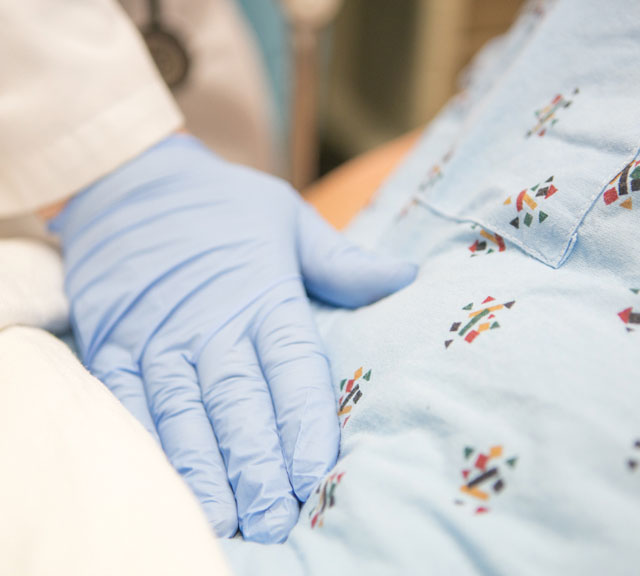Short Bowel Syndrome Shortchanges Nutrition

Answer a few questions and we'll provide you with a list of primary care providers that best fit your needs.
The small intestine plays more than a small role in your health.
It’s responsible for most food digestion and absorption of nutrients that make your body work. You’d be malnourished and ill without it.
And that’s what happens if you have short bowel syndrome (SBS).
Short bowel syndrome is a group of conditions related to poor absorption of food nutrients. SBS is rare, affecting about three of every million people each year.
Short bowel syndrome can develop into serious complications without treatment.
Causes of Short Bowel Syndrome
The primary cause is having a large part of the small intestine removed. And the most common reasons for surgical removal of a large part of the small intestine include:
- Severe Crohn’s disease
- Intussusception, a condition in which part of the small intestine folds over another part, narrowing but not blocking the intestine
- Small intestine injury from a blocked blood vessel
- Trauma, such as a gunshot wound
- Cancer and damage from cancer treatment
- Certain types of weight-loss surgery
In some cases of short bowel syndrome – called functional short bowel syndrome – none of the small intestine is removed. Rather, it doesn’t work properly.
In a few cases, infants are born missing part or much of their small intestine. And in some babies born prematurely, part of the intestine dies.
Symptoms of Short Bowel Syndrome
Diarrhea is a primary symptom of short bowel syndrome. Others include:
- Dehydration
- Bloating
- Cramping
- Heartburn
- Fatigue
- Weight loss
- Sensitivity to new foods
- Swelling, especially of the legs
- Pale, greasy and especially foul-smelling stools
If you experience any of these symptoms, see your health care provider. Short bowel syndrome can develop into serious complications without treatment.
Complications of Short Bowel Syndrome

When your body doesn’t properly absorb nutrients from the food you eat, due to short bowel syndrome, health complications like these can result:
- Malnutrition
- Bacterial overgrowth in the small intestine
- Nervous system problems caused by a lack of vitamin B12
- Metabolic acidosis, a condition in which your blood becomes acidic, due to diarrhea
- Gallstones
- Kidney stones
- Weakened bones, or osteomalacia, which can be caused by lack of nutrients such as calcium and vitamin D
- Weight loss
Diagnosis of Short Bowel Syndrome
When you see your doctor about the symptoms you’re experiencing, she’ll talk with you about your health history, including surgeries you’ve had.
Also, she will examine you and may conduct tests to rule out other causes. These tests may include:
- Blood tests
- Tests for nutritional deficiencies
- Stool tests, which will determine if you are absorbing enough fat
- X-ray of your large and small intestines
- CT scan
- Upper GI series
Treatment of Short Bowel Syndrome
The small intestine naturally adapts after surgery to improve its ability to absorb nutrients. But this can take a year or two. And how much your small intestine adapts can vary, depending in part on the section of small intestine removed in surgery.
Your doctor will prescribe treatment to relieve your symptoms – and make sure your body is receiving the nutrition it requires.
Treatments include nutritional therapy, medications, surgery and intestinal transplant.
Nutritional therapy is the primary treatment for short bowel syndrome and may include:
- Oral rehydration to prevent dehydration and replace salts and minerals
- Total parenteral nutrition (TPN), a special nutritional solution administered through a vein in your body. This can be prescribed to replace or supplement normal eating and drinking.
- Enteral nutrition, which delivers liquid food directly to the stomach or small intestine via a feeding tube
- Vitamin and mineral supplements
- Special diet to meet your specific needs. This may include smaller, more frequent meals and avoiding high-fat foods and foods that cause diarrhea.
Nutritional therapy may vary depending on the part of your small intestine that was removed. The small intestine, which is about 20 feet long, consists of three parts:
- The duodenum, the first section that leads from the stomach. Here, the small intestine absorbs iron and other minerals
- The jejunum, the middle section, where carbohydrates, proteins, fat and most vitamins are absorbed
- The ileum, the lower end, which absorbs bile acids and vitamin B12
Medications may be prescribed to:
- Keep food in the small intestine longer to increase nutrient absorption
- Prevent bacterial overgrowth in the small intestine
- Reduce gastric acid
- Improve bile flow and prevent liver disease
- Decrease diarrhea
Surgery is used to improve the small intestine's ability to absorb nutrients. About half of short bowel syndrome patients require surgery to:
- Slow movement of food through the small intestine
- Prevent blockages
- Narrow a widened section of the small intestine
- Lengthen the small intestine
Intestinal transplant can be a life-saving treatment for short bowel syndrome patients who have life-threatening complications from long-term parenteral nutrition and for whom other treatments have not worked.
A transplant involves removing the patient’s diseased or injured small intestine and replacing it with a healthy small intestine from a donor, who has just died. In some cases, a living donor can provide a segment of her small intestine.
Answer a few questions and we'll provide you with a list of primary care providers that best fit your needs.
Source: National Institute of Diabetes and Digestive and Kidney Diseases; MedlinePlus; American College of Gastroenterology




